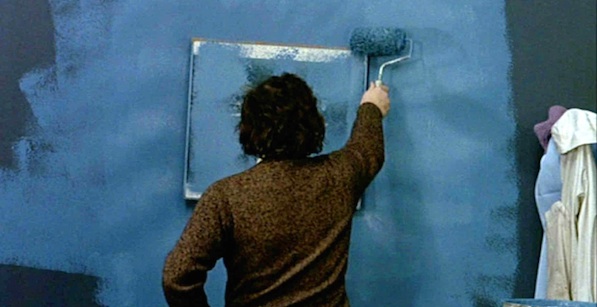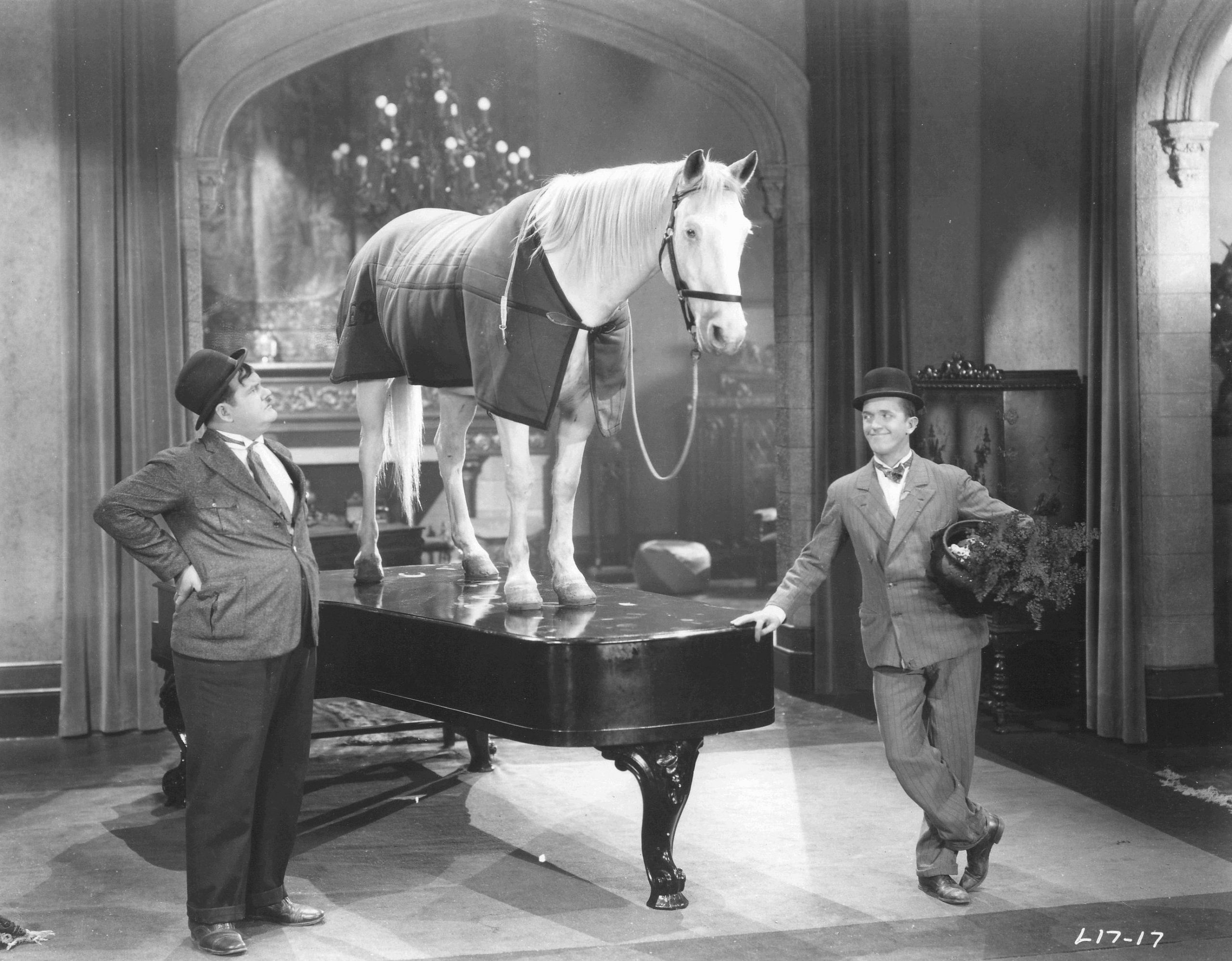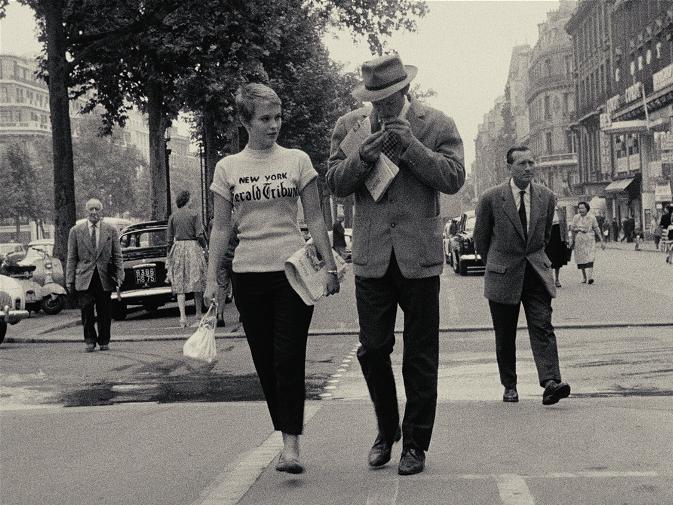
“[It was] this idea of the noise, this idea of a political film that wouldn’t be about elucidation, that wouldn’t necessarily be about finding a constructive conclusion [so much as] simply playing with the textural elements that the reality in which you live gave you. That seemed interesting.” Jean-Pierre Gorin was speaking about his early collaborations with Jean-Luc Godard under the aegis of the Dziga Vertov Group, but like many of his remarks during a recent lecture at the Berkeley Art Museum and Pacific Film Archive, his comments served an apt reminder that Godard has been saying goodbye to language for decades. The reviewers invariably recall Breathless (1960), but the much-maligned Dziga Vertov Group films arguably serve as a better guide to the cacophonous discourses unsettling Godard’s recent work. Brazenly experimental and occasionally tedious, the Dziga Vertov Group films are nevertheless good to think with, as was abundantly clear during Gorin’s lively talk.
Gorin, onetime firebrand of the French left and director of a handful of essay films made deep in the American grain (Poto and Cabengo, Routine Pleasures, My Crasy Life), is a spirited orator—furiously self-questioning and averse to cant, opening up new ground with each fresh digression. No wonder Manny Farber, himself one of cinema’s great originals, roped Gorin into one of his seven “precepts” for good criticism: “Getting the edge. For instance, using the people around you, a brain like Jean-Pierre Gorin’s.” Gorin repaid the favor at BAM/PFA, citing his longtime UC San Diego colleague’s lecture at the New York Film Critics Circle (“some Ale and Quail Club”) as his gold standard:
He came with clips, and he talked before and he showed the clips. Then he came back and said, “Forget everything I said, it’s completely idiotic.” And then he said exactly the opposite, just as brilliantly as [what] he had stated before. It lasted for four hours. To me that’s the reality. If you cannot trip yourself, if you cannot expose the various meanderings and contradictions of your own machine, you’re not doing your fucking job.
The Dziga Vertov Group films, as Gorin made clear, were engineered to produce just such pratfalls. “Fundamentally farcical,” he explained, “We didn’t have the spirit of seriousness, but we were serious.” Later he cued up a still from Laurel and Hardy’s Wrong Again: “That’s the Dziga Vertov Group, two guys forced to act as the third leg of a piano with a horse on it.” One might further pursue the metaphor and wonder if the piano on the Group’s collective backs wasn’t the political rhetoric of its day. The Dziga Vertov Group movies are typically cited—and just as often excoriated—as examples of militant cinema. They certainly were, but they doubled as deconstructions of those same discourses. Gorin set the stage this way in discussing A Film Like the Others (1968): “When you think about ’68 [and] the Free Speech Movement, what it meant was that suddenly you had this enormous amount of speech that was liberated. So the question for filmmakers was, How do you account for this kind of polyphony? What would it be to make a film where all these voices forming a kind of sonic magma would be presented [rather than] represented?”

In striving for possible answers to these questions, the Dziga Vertov Group railed against the complacency of leftist filmmakers drawing upon the bank of imagery associated with the Popular Front as if were 1936 rather than 1968—an elision that implicitly reinforced the idea, anathema to the Dziga Vertov Group, that form is merely the envelope for content. “There was this sense in Godard and in me, that okay, at this point in time what does it mean to make, given the kind of general explosion that we were living in, what does it mean to make a film?” Gorin explained. “There is the idea that forms are not innocent. There is a historicity of forms. You cannot simply grab a camera and go around filming in the streets; there’s something more complicated about it.”
For Gorin, this conflation of distinct political moments was eventually outdone by the outright disavowal of radical politics. He half jokingly called his talk “Against Abjuration: I Persist in Sign” (“When you do something like this you think about a title…something pompous enough to attract the audience”), but his acidic characterization of his generation’s tendency to “very urgently [deny] that they ever said or believed in the thing that they had said or believed” was perfectly in earnest. The Dziga Vertov Group films are unstable objects in this respect: made at a time when it was necessary to upbraid the self-seriousness of militant films, they now stand as documents that these strident discourses actually existed. “In the age of abjuration,” Gorin offered, “people are looking furiously to see if there is a last of the Mohicans—the last of the Marxists.”
Believe me you, we weren’t alone. Believe me you, that type of discourse was quite prevalent. Whether it failed, revealed itself as a sham, revealed itself as this, that, or the other, the fact is that this was the flavor of the moment. And believe me you, fifty years from now people will ask about this moment, How could people believe in that? How could they believe that the rich and the poor could be a continent apart? How could they believe in bombing countries? How could they believe in the general complete decomposition of the act of filmmaking? Don’t worry, just age. It will happen; it’s not that fucking great.
Gorin offered many ways of understanding the Dziga Vertov Group films as products of their oft-misconstrued moment, and yet he also suggested how their overriding attention to form might resonate with filmmakers in different contexts. “I know it’s farcical anthropology, but I think there are two tribes among filmmakers,” Gorin mused,
There are the people of the idiom, who are essentially people who function within the accepted narrative rules. They can do and have done absolutely extraordinary, exquisite films within those paradigms: Bergman, Renoir, Ford, etc. And then there’s another school, another tribe, and that tribe I call the Grammarians. They are the people who are obsessed with questioning or being baffled by the act of filmmaking. I think Dziga Vertov Group is one of them. I think that somehow we brought this name [back] into some kind of prominence…because the Grammarians talk to the Grammarians.
This secret engine of film history, stretching back at least as far as the original Vertov’s “machine cinema,” is where Godard’s cinema, among others, continues to live. Without making a fuss of it, Gorin neatly encapsulated the revolution in form of Godard’s earliest work:
Really, Godard is what? Godard is a guy who doesn’t know how to light, ok? He asks himself, ‘What is the moment in the day where there is the least problem of light?’ And the answer is midday. At midday it falls straight on the figure, the figure becomes two-dimensional, splattered against the backdrop. Put some primary colors on it, and mowee-zowee, you suddenly have left literature, and you are in a terrain that Mr. Matisse has perfectly defined. And then the problem becomes not at all to write a story about a girl who had a father that mistreated her and a lover that couldn’t quite treat her well, but it’s about a girl in a red sweater and a blue skirt going into a white space.

Of course this poetic turn would not be enough to pacify the ever-restless auteur. “He found himself in a strange situation in 1968,” Gorin continued. “More than any [other] filmmaker, he had molded the moment. Sixty-eight is basically Godard happening in the face of Godard.” May provided the necessary shock for him to break with narrative and do the Dziga Vertov Group. Godard’s collaborations with Gorin did not dispel the anguish underlying his earlier films—to the contrary, they allowed it to rise to the surface. “There’s this aspect of the Dziga Vertov Group that you try,” Gorin offered. “You try, and it’s beyond failure or success. You try, you have fun doing it, it doesn’t cost jack. And it’s a capacity to talk between each other as to the possibility of retooling the cinema.” At odds with the world, the Dziga Vertov Group films stand for inventing your own.



